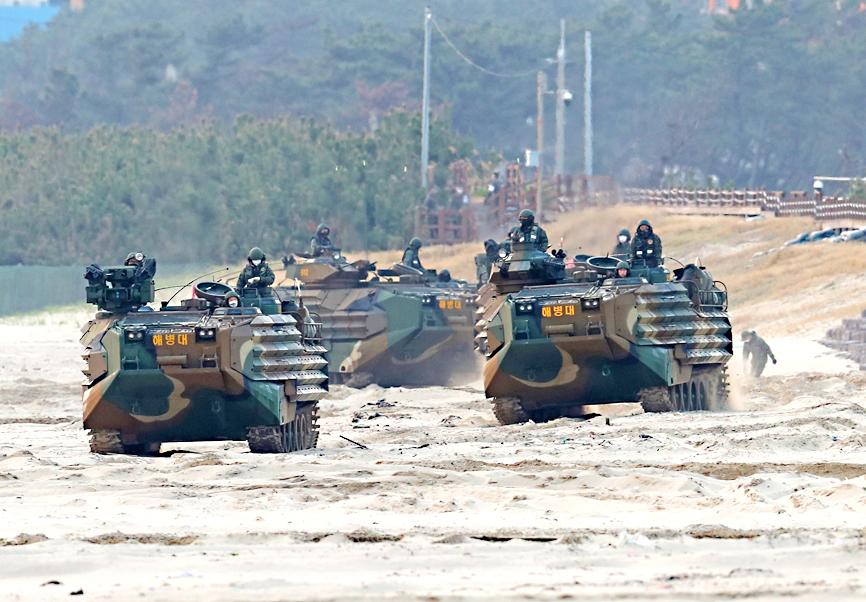Advisers to South Korean president-elect Yoon Suk-yeol sought redeployment of US strategic assets, such as nuclear bombers and submarines, to the Korean Peninsula during talks held on a visit to Washington, one of the advisers said yesterday.
The team of foreign policy and security aides to Yoon met US National Security Adviser Jake Sullivan, as Yoon seeks a more constant security presence to deter threats from North Korea as it steps up weapons tests.
“Deploying the strategic assets is an important element of reinforcing the extended deterrence, and the issue naturally came up during the discussions,” Park Jin, a four-term lawmaker who led the delegation, told reporters.

Photo: EPA-EFE
He added that both sides explored ways to bolster US extended nuclear deterrence at the talks on coordinating efforts against the North Korean threat held on a trip that also aimed to secure an early summit with US President Joe Biden.
Asked about such talks and whether Washington supported the deployments to South Korea, a White House official said that both sides had “discussed generally” the US defense commitments.
Yoon, set to be sworn in on May 10, is mapping out his foreign policy agenda after winning the March 9 election, just as tension flares after Pyongyang launched an intercontinental ballistic missile (ICBM) last month.
The deployment of US bombers, aircraft carriers and nuclear submarines is part of Yoon’s election plank promising to “respond firmly” to the North’s threats.
Yoon has also vowed to “normalize” joint military drills with the US that were scaled back under South Korean President Moon Jae-in, in a bid to placate Pyongyang and resume stalled talks to rid the peninsula of nuclear weapons.
North Korea has long denounced the exercises as a rehearsal for war, and the allies have reduced field training and shunned use of major weapons, such as bombers and air carriers, focusing instead on computer simulations.
However, Park did not elaborate when asked about plans for regular spring exercises, which local media have said could include nuclear bombers for the first time in nearly five years.
“We agreed that what’s most important is to maintain deterrence so that we can strongly respond to any possible North Korean provocations,” he said, whether ICBM launches or psychological warfare in the form of verbal attacks.
The delegation invited Biden to visit Seoul when he travels to Asia to meet the Quad grouping of nations, which also includes Japan, Australia and India, Park added.
He also delivered a letter to Biden from Yoon highlighting his “solid willingness and vision” to advance ties not only on North Korea, but also economic security and other issues, he said.

VAGUE: The criteria of the amnesty remain unclear, but it would cover political violence from 1999 to today, and those convicted of murder or drug trafficking would not qualify Venezuelan Acting President Delcy Rodriguez on Friday announced an amnesty bill that could lead to the release of hundreds of prisoners, including opposition leaders, journalists and human rights activists detained for political reasons. The measure had long been sought by the US-backed opposition. It is the latest concession Rodriguez has made since taking the reins of the country on Jan. 3 after the brazen seizure of then-Venezuelan president Nicolas Maduro. Rodriguez told a gathering of justices, magistrates, ministers, military brass and other government leaders that the ruling party-controlled Venezuelan National Assembly would take up the bill with urgency. Rodriguez also announced the shutdown

Civil society leaders and members of a left-wing coalition yesterday filed impeachment complaints against Philippine Vice President Sara Duterte, restarting a process sidelined by the Supreme Court last year. Both cases accuse Duterte of misusing public funds during her term as education secretary, while one revives allegations that she threatened to assassinate former ally Philippine President Ferdinand Marcos Jr. The filings come on the same day that a committee in the House of Representatives was to begin hearings into impeachment complaints against Marcos, accused of corruption tied to a spiraling scandal over bogus flood control projects. Under the constitution, an impeachment by the

Exiled Tibetans began a unique global election yesterday for a government representing a homeland many have never seen, as part of a democratic exercise voters say carries great weight. From red-robed Buddhist monks in the snowy Himalayas, to political exiles in megacities across South Asia, to refugees in Australia, Europe and North America, voting takes place in 27 countries — but not China. “Elections ... show that the struggle for Tibet’s freedom and independence continues from generation to generation,” said candidate Gyaltsen Chokye, 33, who is based in the Indian hill-town of Dharamsala, headquarters of the government-in-exile, the Central Tibetan Administration (CTA). It

A Virginia man having an affair with the family’s Brazilian au pair on Monday was found guilty of murdering his wife and another man that prosecutors say was lured to the house as a fall guy. Brendan Banfield, a former Internal Revenue Service law enforcement officer, told police he came across Joseph Ryan attacking his wife, Christine Banfield, with a knife on the morning of Feb. 24, 2023. He shot Ryan and then Juliana Magalhaes, the au pair, shot him, too, but officials argued in court that the story was too good to be true, telling jurors that Brendan Banfield set